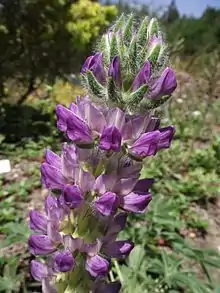Lupinus microcarpus
Lupinus microcarpus, the wide-bannered lupine or chick lupine, is a species of lupine native to western North America from southwestern British Columbia south through Oregon and California, including the Mojave Desert, and into Baja California. There is also a disjunct population in South America, with locations in central Chile and western Argentina.
| Lupinus microcarpus | |
|---|---|
 | |
| Lupinus microcarpus var. microcarpus | |
| Scientific classification | |
| Kingdom: | Plantae |
| Clade: | Tracheophytes |
| Clade: | Angiosperms |
| Clade: | Eudicots |
| Clade: | Rosids |
| Order: | Fabales |
| Family: | Fabaceae |
| Genus: | Lupinus |
| Species: | L. microcarpus |
| Binomial name | |
| Lupinus microcarpus | |
Description
Lupinus microcarpus is an annual plant growing to 80-centimetre (31 in) tall. The leaves are palmately compound with 5-11 leaflets 1-centimetre (0.39 in)–5-centimetre (2.0 in) long and up to 1-centimetre (0.39 in) broad.
The flowers are generally pink to purple in color, but can also be between white and yellow; they are produced in open whorls on an erect spike.
Lupinus microcarpus grows from sea level in the north of its range, up to 1,600-metre (5,200 ft) high in Southern California.

Varieties
There are three named botanical varieties:
- Lupinus microcarpus var. densiflorus - whitewhorl lupine[1] or dense-flowered lupine. Endemic and restricted to western California (formerly Lupinus densiflorus).[2]
- Lupinus microcarpus var. horizontalis. Endemic and restricted to southeastern California deserts.[3]
- Lupinus microcarpus var. microcarpus. Widespread, British Columbia to Chile.[4]
Phytoremediation waste management
Chilean scientists (Universidad de Santiago de Chile) studying phytoremediation waste management in the city of Antofagasta, discovered that plants are capable of absorbing arsenic from the soil.
References
- "Lupinus densiflorus". Natural Resources Conservation Service PLANTS Database. USDA. Retrieved 24 June 2015.
- Jepson Manual treatment for LUPINUS microcarpus var. densiflorus . accessed 10.21.2011
- Jepson Manual treatment for LUPINUS microcarpus var. horizontalis . accessed 10.21.2011
- Jepson Manual treatment for LUPINUS microcarpus var. microcarpus . accessed 10.21.2011
- Mojave Desert Wildflowers, Jon Mark Stewart, 1998, pg. 137
- Chilean Scientists use the plant for wastes' Phytoremediation clean-up management of soils.
External links
| Wikimedia Commons has media related to Lupinus microcarpus. |